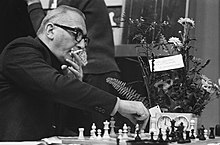Herman Pilnik

|
|
| Herman Pilnik, Beverwijk 1963 |
|
| Association |
|
| Born | January 8, 1914 Stuttgart |
| Died | November 12, 1981 Caracas |
| title |
International Master (1950) Grand Master (1952) |
| Best Elo rating | 2450 (July 1972) |
Herman Pilnik , originally Hermann Pilnik (born January 8, 1914 in Stuttgart , † November 12, 1981 in Caracas ) was a German-born Argentine chess player . In the 1950s he was one of the world's best.
Life
Herman Pilnik's ancestors came from Vilnius and spoke Yiddish with his parents . The ten year old learned chess after watching his father and uncle play. As a 15-year-old he was Stuttgart city champion and a year later Württemberg gaumeister (shared with Hans Schmid). In 1930 he emigrated with his parents to Argentina , where he first tried his hand at business before becoming a professional chess player. Initially not particularly successful, Pilnik described the personal encounter with Alexander Alekhine during the Chess Olympiad in Buenos Aires in 1939 as a powerful stimulus (Pilnik acted as the chief referee, but was able to play a few free games with Alekhine in between). He then won the Argentina championship three times: in 1942, 1945 and 1958. Since 1942, when he was 10th-11th in New York . became, he participated in international tournaments . In 1944 he shared 1st and 2nd place in Mar del Plata , won the Paraguay championship in Asuncion and finished 2nd in Vina del Mar (Chile) behind Gideon Ståhlberg . In 1945 he was third in Hollywood in the Pan American Championship (behind Samuel Reshevsky and Reuben Fine ), although he had a serious car accident shortly before and doctors advised him against participating in the tournament. In 1948/49 he shared third place with Max Euwe in New York , after a tournament in Mexico in 1949 he traveled to Europe and continued to play very successfully there. At the Chess Olympiad in Dubrovnik in 1950 he scored 75% on board 5 for Argentina, immediately afterwards he was second (behind Miguel Najdorf ) in the strong tournament in Bled . In the same year he was named International Master by the World Chess Federation FIDE . In 1951 he played a 3-3 draw in Zurich against Efim Bogolyubov . In the same year he shared second place in Madrid and won in Beverwijk .
In 1952 he won in Belgrade and took part in the 1952 interzonal tournament in Saltsjöbaden . FIDE awarded him the title of Grand Master that year .
Pilnik also took part in the next interzonal tournament in Gothenburg in 1955, in which his divided 7th – 9th Place (with Boris Spasski and Miroslav Filip ) meant qualification for the Amsterdam 1956 Candidates Tournament . At this tournament Pilnik was tenth (last). Pilnik represented Argentina at five Chess Olympiads ( 1950 , 1952 , 1954 , 1956 and 1958 ). With the team he reached second place in 1950, 1952 and 1954 and third place in 1958, in 1950 he also achieved the best individual result of the reserve players. After the tournament in Mar del Plata in 1959, he settled in Chile , where he stayed until 1970 and then returned to Argentina. He spent the last years of his life as a chess trainer and often changed his place of residence. Most recently he was a trainer in Venezuela at the Caracas Military Academy , where he died in 1981.
A variant in the Sicilian Defense used to be named after Pilnik ( Pilnik system ) : 1. e2 – e4 c7 – c5 2. Ng1 – f3 Nb8 – c6 3. d2 – d4 c5xd4 4. Nf3xd4 Ng8 – f6 5. Nb1 – c3 e7 – e5 6. Nd4 – b5 d7 – d6 (previously 6.… a7 – a6). Pilnik developed it together with Jorge Pelikan , after whom it is also often named: Pelikan variant. Pilnik played already in the 1950s (e.g. against David Bronstein in Moscow in 1956 and against Efim Geller in Amsterdam in 1956); this system was only thoroughly researched in the 1970s by Soviet players from Chelyabinsk and is now internationally known as the Sveshnikov variant .
Pilnik's last Elo number was 2435, its highest Elo number of 2450 he had in July 1972. Before the Elo numbers were introduced, Pilnik achieved its highest historical Elo number of 2670 in August 1945 .
Web links
- Replayable chess games by Herman Pilnik on chessgames.com (English)
Individual evidence
- ^ Entry "Pilnik, Hermann", in: Klaus Lindörfer: Schachlexikon. History. Theory and game practice from A – Z , Orbis Verlag, Munich 1991, p. 195. ISBN 3572027349 .
- ↑ Interview with Hermann Pilnik. Deutsche Schachrundschau Caissa No. 21, 1952: pp. 405-406.
- ^ Willy Iclicki: FIDE Golden book 1924-2002 . Euroadria, Slovenia, 2002, p. 74.
- ↑ Herman Pilnik's results at the Chess Olympiads on olimpbase.org (English)
- ↑ Elo history at olimpbase.org (English)
- ↑ Hermann Pilnik's historical Elo numbers on chessmetrics.com (English)
| personal data | |
|---|---|
| SURNAME | Pilnik, Herman |
| ALTERNATIVE NAMES | Pilnik, Hermann (full name) |
| BRIEF DESCRIPTION | Argentinian chess player of German origin |
| DATE OF BIRTH | January 8, 1914 |
| PLACE OF BIRTH | Stuttgart |
| DATE OF DEATH | November 12, 1981 |
| Place of death | Caracas |